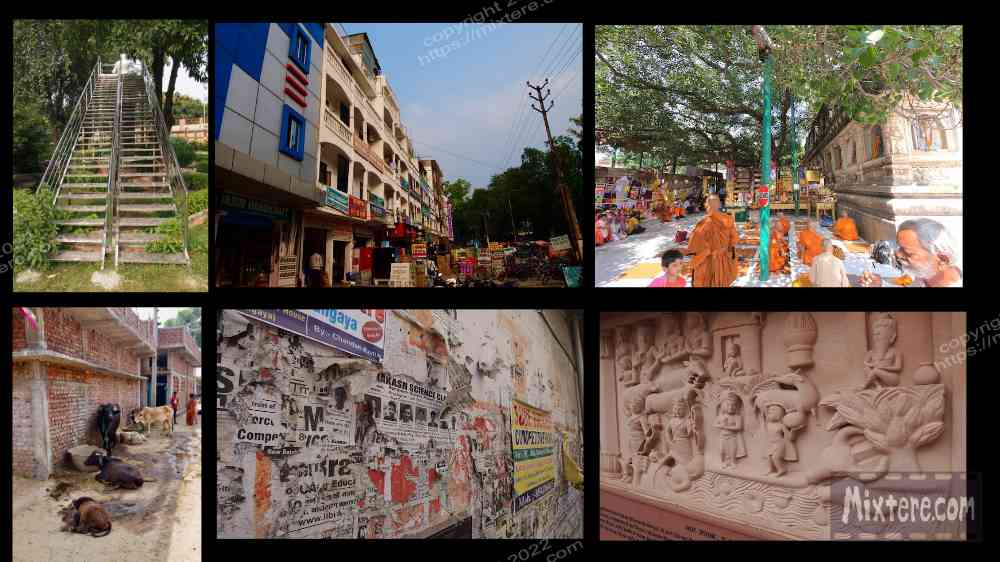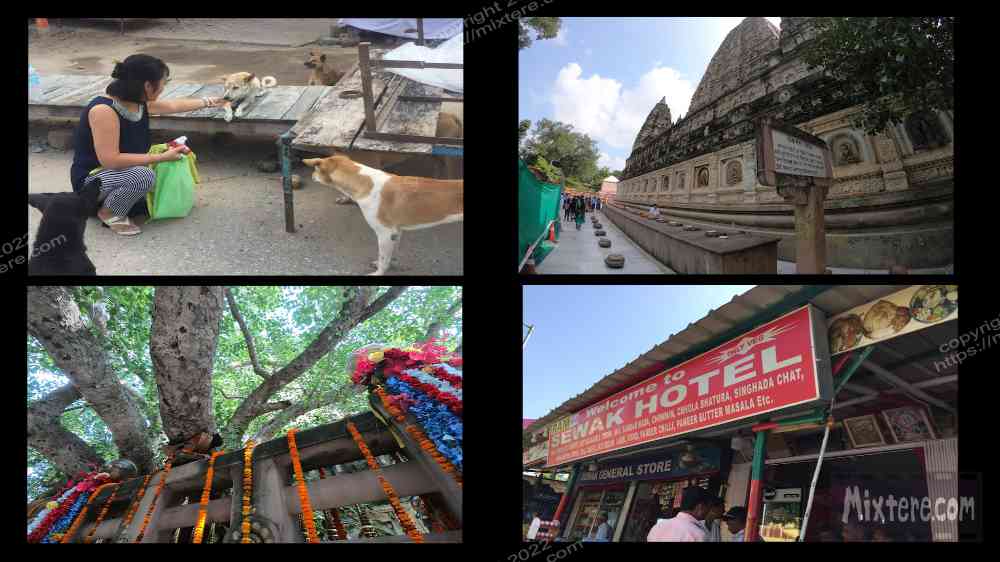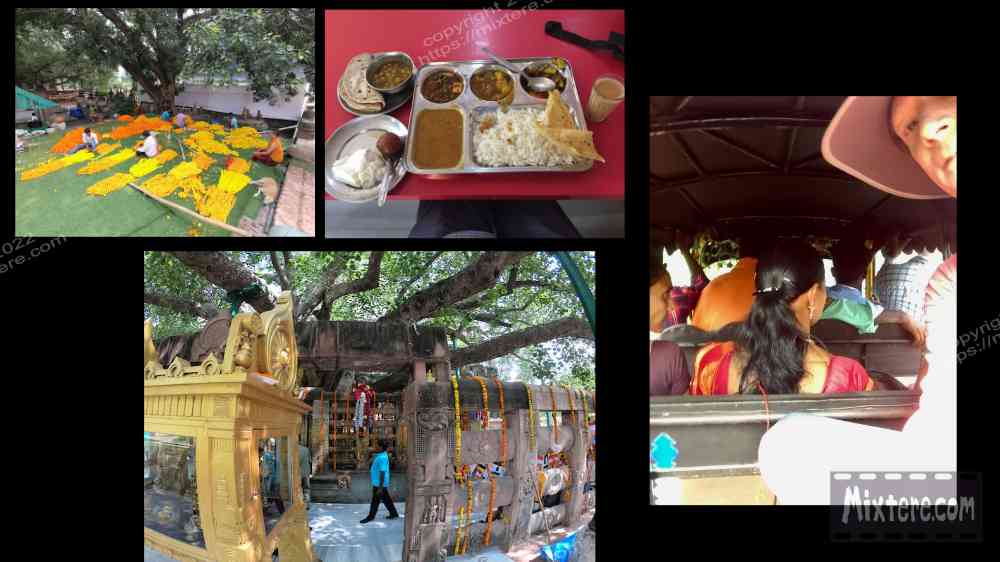
Well, I lingered in Bodh Gaya a little too long. Waves of hard-hitting reality and a new illness hit me at the guesthouse in Sujata Village. In attempts to minimize plastic waste I had been buying the “boiled” well water that Iz marketed to his guests. It was boiled and I have no doubt that all efforts were made to make it safe for the guts of foreigners. Well, at first I had been careful and had run the prepared water through the backpacking filter I had brought for the occasion. But then I got lazy and convinced by other foreigners that making such efforts was overkill and “wimpy.” I soon found myself emitting the first parasite burps since… my first trip to India. Giardia burps rumble in your midsection and then emit from your mouth as the ungodly language of some sulfurous demon residing within. They can’t be controlled...again and again the burps come. It’s not unlike having the hiccups, just drawn out more in frequency.
It’s not a healthy or pleasant experience and must be dealt with promptly. Being on my own I took Iz’s offer to take me into Gaya to see the “doctor” that he worked with. Well, the visit to the doctor didn't instill confidence. With it came a newfound gratitude for the medical services I have been able to access as an American. Iz’s doctor boss diagnosed an intestinal infection and recommended a few medicines and, bizarrely, fruit. Uncooked fruit and vegetables (mostly when prepared by others) are often good ways to get sick in the first place in India. But I was desperate so after the appointment Iz took me to an area of Gaya that had fruit vendors out at the late hour. Their prices, unsurprisingly, were very high. I ended up paying almost as much as I would in the states for some coconuts, bananas, apples, oranges and a pineapple. We then stopped at a pharmacist to get the drugs.
For a while it seemed like I was on the mend. The burps settled down and seemed to go. But I could still hear and feel things swimming in my intestines. Iz and the doc and the resources of Bihar had done what they could for me. I had my eye on a train ride to Assam. Guwahati, its capital, had been on my itinerary, promised better medical care and a much welcome change of scenery. It’s never fun or smart to travel sick but it seemed a better alternative to wasting away in Bodh Gaya. Plus in the modern smartphone age I had been able to book accommodation and correspond with my new airbnb host Hironmoy. In him I seemed to be in good hands. So on October 22nd I departed Bodh Gaya for what may have been the last time. Subi and some of the residents seemed sad to see me go but there was nothing to be done about it. Travelers come and then they go. They were more experienced with this than I was.
I was stubbornly still trying to do things the way the real backpackers do, I hoisted all my belongings onto my back, said my goodbyes and walked out the back gate of the guesthouse. I threaded the narrow paths between the fields and came out on the road sweating and huffing under the hot sun with the weight of my gear. It was another warm and dusty day. My goal for the moment was a shared rickshaw to the Burmese Vihar. From there I would catch another to Gaya station. But rickshaw after rickshaw passed me without stopping. For some reason my foreign self wasn’t so popular that morning. The sun was beating down so I walked across the road and sat on my pack in the shade of a tree. I continued trying to flag down shared rickshaws to no avail. Some goats and chickens stared at me from a nearby yard, wondering what my problem was. There is peace in that moment before travel, a pause before the chaos. The wind blew and rustled the leaves in the shade. More rickshaws came and went. The only ones that would stop were empty ones, their drivers eyes widening with plans to charge me exorbitant fees.
It may sound silly to pass these up but if the budget traveller does not make continuous efforts to adhere to the budget the cost of travel increases quite quickly. And if you are staying in the same area word passes around that you are an easy mark. The budget traveller must not give up the budget but must also not lose his or her cool. This is one of the main challenges for Westerners traveling in India. You will always pay more than a local but out of principle you must make an effort not to be completely fleeced. It’s a battle that backpackers as well as Indians are expected to make. Westerners consistently get frustrated with there never being an established price or schedule for anything. But haggling and waiting are part of the cultural experience.
A couple of village youths chatted me up while I sat there in the shade. They could see the situation and smiled good-naturedly. I appreciated that. The wave of sympathy must have spread wider as some local passing on his motorcycle had pity on me. He stopped and urged me to get on the back for the quick jaunt across the river to the Vihar depot. Again, the difference this simple gesture made for me, a gesture devoid of scheming, was huge. I got off at the Vihar and thanked the cyclist profusely. Then another kind bystander helped me find a spot on a shared rickshaw to gaya station. This was a much needed turn of events as the train’s departure time was uncomfortably near.
Due to this it was a nail-biting ride to Gaya. I really did not want to miss my train and be stranded for another week or two in Bihar. We arrived at the station with no time to spare. Here I was, in the squalor of Gaya train station, in the poorest state in India, sick and hurriedly trying to orient myself for train travel after not having done it for 23 years. It did not go smoothly. I refused porters offers and walked halfway up and over the walkway that skirted the tracks. There I was met with a contradicting puzzle of train-platform signage. With all my gear I went all the way back and down into a train officer’s booth. There a man in uniform was busy watching television. I asked him to help me find the platform that I needed. With a wave of his hand he insisted that they were labeled correctly and to please leave him be. Breathing and sweating heavily now, I forded the walkway again and made a calculated guess on the platform offramp I chose. Again events turned in my favor and I chose correctly. No sooner was I on the platform than the train pulled up. I boarded, the train lingered for a minute, and then sped off again. It had been a close shave. But it was dawning on me that I was not actually in control. I was learning to submit to the will of whatever was shuttling me along my journey.
Normally one positions oneself on the platform in accordance with a map that shows where one’s seat on the train is. There is a numbered and lettered breakdown from the front of the train to help with this. But my haste had not allowed me time to position myself. So I had to carry my large pack on my back and my smaller one on my stomach as I pressed myself through the people and berths until I found the correct seat. My rolled yoga mat snagged on each and every seat and passenger. No one complained, bless them. When I got to my seat I was intrigued to see the man that had helped arrange the rickshaw from the Burmese Vihar sitting in the same compartment. Again we greeted each other and again I thanked him for his efforts. His name was Abhay. He was headed to the outskirts of Shillong, Meghalaya, not too far from Guwahati. We chatted a bit but Abhay was short on words. That was fine with me.

In our compartment was a young husband, wife and kids, a young novice monk in robes and Abhay. Through the 24 hour journey I struck up a bit of a friendship with Abhay and the monk, Rajanam. Abhay had been visiting family near Bodh Gaya and worked in an administrative capacity for the Indian Air force. He was stationed in a village about a thousand feet above Shillong, Meghalaya. To get there he had to "entrain" to Guwahati, often referred to as “The gateway of the northeast.” Rajanam had been studying at a Buddhist University in Bodh Gaya and was returning to his monastery, the Golden Temple in Namsai in Arunachal Pradesh. Rajanam also had to go to Guwahati to connect with busses headed toward Namsai. With Abhay’s help the train conductor also befriended me. So my behaving myself and trying to be a good ambassador of American culture was working a bit in my favor despite my feet hanging off the bed.
Talk with Rajanam and Abhay was brief and limited. Much of the time was spent gandering out the window and watching the landscape gradually transform as dusk approached. This is an enjoyable pastime that even the most seasoned Indian travelers seemed to enjoy. I feel that watching the scenery pass as the train rocks you to and fro is pleasant. It was actually late that night when I discovered that I could not fit or sleep in my suspended sardine can of a bunk. The train conductor kindly helped me find an unoccupied seat down the car. I think he intervened so that the lady across from me would stop complaining about my standing in the isle to stretch my legs. I think she thought I was up to something. The conductor’s gesture to me is an example of caring gestures that do not happen so often in the US as employees are bound by strict rules.
So despite all the discomforts and annoyances I have written about thus far, there are moments as a traveler in India when I feel that I am cared for much better than I am in my home country. There is great character and integrity to so many of the Indians I have met. In most regards I would actually expect better behavior from someone in India than I would from someone native to the USA. There is magic to riding a train in India. This is not a bullet train. This is not a subway. There are different lines that go at different speeds but in general, one moves along at a humane pace. The traveller is able to watch the country as it passes by, to see the land and feel the climate gradually change. This is especially true of the non-AC cars, when the air and smoke and rain come breezing through providing a better feel of the land.
When one is traveling solo on a train one is forced to interact with, tolerate and learn from those seated around. As opposed to riding with an insulated tour group, this is a process of acclimatizing to your environment through measured exposure to it. In traveling this way I and my fellow passengers were more approachable and had more opportunities to better get to know each other. On a train you are plopped next to strangers in an honest manner that in almost any instance has nothing to do with any potential hustling angle. This can be a relief for travelers as they can let their guard down. And locals can see that the wandering foreigner is alone, weary, minding his own business and trying to respect local custom even if he is clueless. He is no threat and his eyes are wide with all that he is experiencing.

Rocking back and forth on the train I reflected upon how by coming to this land I had transformed my status from that of a poor man of little value in my home country to an often honored, valued visitor. That’s quite a transformation to experience. In many cases I was one of if not the only American these people had met. Many of them were honestly excited to meet me. I felt honored in acting as an informal ambassador of my county. I tried to make an impression that I and my country could be proud of. Professor Robert's preparation so many years ago had helped. I wore a button-up sleeved shirt and trousers. I kept clean and shaved and sat up straight. I used the little Hindi and customs that I knew to try to show respect. I was mindful of what I did with my left hand, where I placed my feet, of not letting my eyes linger on ladies, of addressing people formerly. These gestures were usually returned ten-fold. Many of the people I meet were proud and excited to be sharing their Indian heritage with me.
That heritage varied according to the particular region I was traveling in. Through peoples opinions, areas of expertise and ignorance, their tastes and mannerisms, I was able to get a much better handle on the specific culture of my location than through any book or internet research. Some places were more conservative than others. Some places leaned more toward being bustling, loud and aggressive (usually near the big cities). In some places the majority was Muslim, Christian, or Jain and even the forms and traditions of these faiths varied according to location. In some places people ate meat and drank alcohol. In other places these practices were forbidden. In some places ladies dressed more revealingly, in others they covered themselves thoroughly. Languages spoken varied and I could not begin to identify all that funneled in through my ears.
I was grateful and eager to experience all of the culture; to taste it in the food (once off the train), hear the music and language, see the customs, the land, etc. On the train there are more safe opportunities of these than anywhere else. Almost universally the people enthusiastically offered help and information. They made recommendations for places to visit, eat and spend the night. They shared their stories, their faith, their passions, their thoughts about the USA and valuable news and information related to the region, such as natural, social or animal dangers and delights. I found this infinitely more valuable and accurate than some internet content or travel book. In addition, the information is gained through the process of a human intercultural interaction. You sense, see, hear, smell the people. No tech company can provide this through pixels and algorithms. In turn these passengers learned directly about the USA from the American in front of them.
In the above ways the folks on the train truthfully connected with each other. I feel this is a rare phenomenon in the states these days. In this process it is fair to say that we were all puzzled and intrigued by each others' cultural differences. As we headed east toward Assam the land went from dry and dusty to increasingly green, lush and expansive. The air became infused with moisture and scents. It was mesmerizing to watch through the windows, be rocked by the rattling rhythm of the tracks as these changes slowly happened. By morning it was apparent that, again, I had arrived in a new land. The dusty plains and scattered rocks of Bihar had given way to what looked like fertile river valleys with lots of rice and tropical plant life. The land resembled what I recalled from a brief trip to Thailand in my youth. The air was fresher and absent the fouling particulates that had made breathing in Bihar so laborious.


